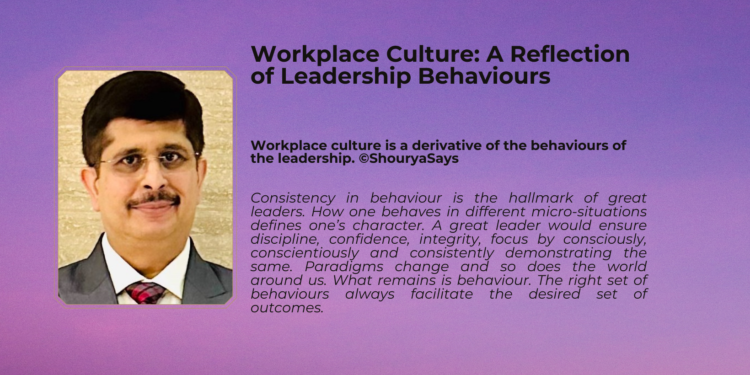© #ShouryaSays
By Shourya K. Chakravarty, Chief Human Resources Officer, Aptech
Workplace culture is not defined by policies, mission statements, or vision documents—it is shaped by the behaviours of leadership. How leaders act in various situations sets the tone for the entire organization, influencing employee engagement, trust, and overall performance.
The Power of Consistency in Leadership
Great leaders are consistent in their behaviour, ensuring that their values and actions align in every situation. Their character is revealed not in grand moments, but in how they handle everyday interactions and micro-situations. Leadership is not just about making decisions; it is about maintaining a steady, principled approach regardless of circumstances.
True leadership demands discipline, confidence, integrity, and focus—traits that must be demonstrated continuously and conscientiously. A leader who exhibits these qualities not occasionally, but consistently, inspires trust and fosters a strong workplace culture. Employees take cues from leadership, and when they observe reliability in their actions, it reinforces a culture of stability and ethical decision-making.

Leadership in a Changing World
The world around us is constantly evolving—business landscapes shift, industries transform, and market dynamics fluctuate. Yet, amid these changes, one thing remains constant: behaviour.
While strategies and operational models adapt, the fundamental qualities of leadership—integrity, transparency, and discipline—must stay intact. In times of uncertainty, employees look to leadership for guidance and assurance, and it is the leader’s behaviour that dictates the team’s morale and direction.
An organization’s culture is a living, evolving entity, and its long-term success depends on leadership behaviour that promotes the right set of values. Leaders who prioritize discipline encourage accountability. Those who demonstrate confidence instill trust. When integrity is upheld, ethical decision-making becomes second nature within teams.
Shaping the Desired Outcomes
Culture and outcomes are interconnected. A workplace culture built on strong leadership behaviours naturally fosters higher engagement, productivity, and innovation.
Organizations that thrive over the years have leaders who lead by example, ensuring that the right behaviours are ingrained in their corporate DNA. A leader’s behaviour is more powerful than any written policy, as employees internalize what they observe and experience daily.

Final Thoughts
Workplace culture is not a standalone entity—it is a derivative of leadership behaviour. While markets, business models, and external environments may change, the behaviours that leaders demonstrate define their legacy and the organization’s future.
To build a thriving workplace, leaders must embrace consistency in behaviour, demonstrate values with unwavering commitment, and set the benchmark for cultural transformation. After all, the right behaviours will always facilitate the desired outcomes.
Read Also : Entering 2025, TA Leaders’ Success Built on More than Just Hiring, Says The Josh Bersin Company
People Analytics Teams Still Struggle to Deliver Business Impact, Warns The Josh Bersin Company
ESG and Women’s Leadership: Driving Sustainability and Inclusion
Learning and Development Trends for 2025: Shaping the Future of Workplace Learning










